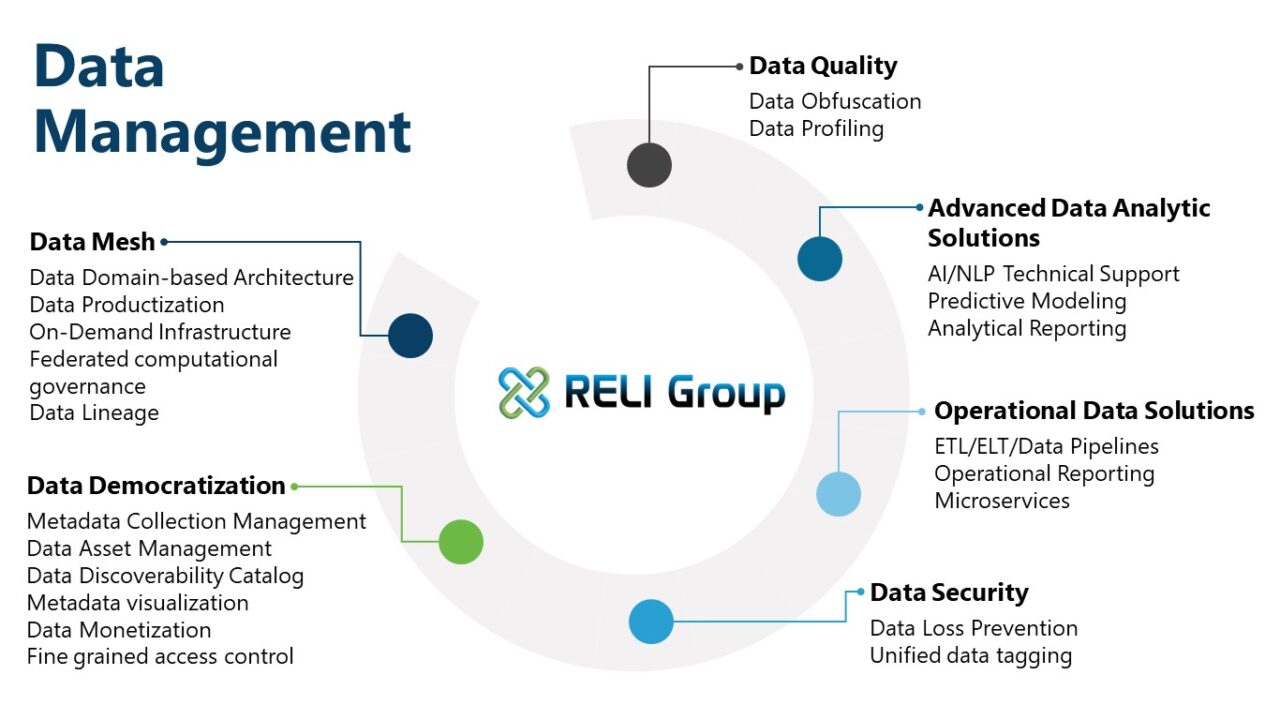Understanding Data Management

RELI Group has been strategically bidding and sustaining contracts to advance our portfolio in the Data Management space. RELI’s Data Management capabilities include:
- Data Mesh

- Advanced Data Analytic Solutions
- Operational Data Solutions
- Data Security
- Data Democratization
- Data Quality
Given the rapid growth of data sources, complexity of our partner organizations, and the scope of our aspirations to get value from data with AI and analytics, our existing data management solutions are no longer a match. Zhamak Dehghani in her book “Data Mesh” refers to this as an “inflection point.” Dehghani goes on to state the four key aspects of data mesh: “Domain-oriented decentralized data ownership and architecture, data as a product, self-serve data infrastructure as a platform, and federated computational governance.”
Data democratization is the process of helping users discover and understand the data before putting it to analytic use. Given the volume, velocity, variety and veracity of the data, we need the next generation of tools and processes to democratize data. The first objective is to establish a comprehensive collection mechanism for metadata at various stages of the data flow, to capture the lineage using data asset management, to create a Data Discoverability catalog using tools like Alation, to create metadata visualization artifacts like mind maps to understand the data footprint using tools like ERwin Data Intelligence Suite of tools, to implementing fine grained access controls using tools like Privecera, paving the path for Data Monetization across an enterprise or a data marketplace.
Due to recent advances in the volume and variety of data, many organizations are often plagued with finding the right data across their “data dumps.” The success of such an organization depends on adopting a data democratization methodology to gain insights from all its data assets. RELI’s recent awards provide an opportunity to shape the future of this discipline through our performance at the Centers for Medicare & Medicaid Services (CMS) – a major federal player in the data management space.
Data Quality framework when interlaced with data pipelines results in monitoring the accuracy of data, which plays a crucial role in creating trust across the user community. Previously, CMS solved this problem by creating quality initiatives which project the veracity of the data. RELI proposed this solution in Multi-dimensional Insurance Data Analytics Systems (MIDAS), which deals with marketplace enrollment data. MIDAS is an operational data warehouse that aggregates the enrollment data from the CMS Marketplace to provide access to several decision support systems. To prevent failures due to bad data, RELI proposed the creation of data contracts between the upstream and downstream systems, enforcing the contracts by using data quality frameworks built within the ETL pipelines and publishing data scores. Along a similar line, tokenization allows users to work on synthetic data for testing purposes. Data profiling, on the other hand, helps users access the quality and quantity aspects of any dataset.
RELI can also provide support on Operational reporting and advanced analytic solutions, including various Business Intelligence tools, predictive modeling and using AI/NLP to find insights in the data. At CMS, we work with PHI/PII data that requires individuals to detect potential data breaches by monitoring, detecting and blocking sensitive data while in use, in motion and at rest. Unified tagging and data loss prevention practices are additional functions that RELI can help implement on sensitive data.
A decade ago, the spectrum of data management was limited to creating analytic platforms for users. Today, this spectrum has expanded to include enhancing data discoverability, supporting advanced analytic solutions, implementing a data mesh, advancing the vision of extract, load and transform processes, and interlacing data quality within the data pipelines while securing the data in transit and at rest. RELI’s continued growth and advancement in government contracting showcases the necessity for staying up to date with data management technologies.
RELI’s Data Life Cycle & Analytics team is responsible for exposing the data life cycle advantage to create actionable insights. This sector is responsible for the management and implementation of emerging data technology and keeping RELI informed on top trends to incorporate throughout government contracts. To learn more about RELI’s Data Life Cycle & Analytics capabilities, visit www.RELIgroupinc.com/capability/data-life-cycle-analytics/.














